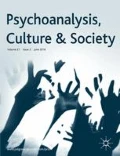Abstract
After a brief description of the ethical turn and its historical-political dimension within psychoanalysis, this article will introduce the special issue’s four papers and two responses, all of which were presented at the 2013 Psychology and the Other Conference. These articles represent substantive additions to the burgeoning literature highlighting the intersections of ethical phenomenology, hermeneutics, psychoanalysis and political life. They provide innovative conceptions of the intergenerational transmission of historical and political practices and the shape and nature of ethical subjectivity and its relationship to the unconscious, and offer new modes for understanding political subversion.
Similar content being viewed by others
References
Altman, N. (2010) The Analyst in the Inner City: Race, Class, and Culture Through a Psychoanalytic Lens. 2nd edn. New York: Routledge.
Aron, L. and Starr, K. (2013) A Psychotherapy for the People: Toward a Progressive Psychoanalysis. NY: Routledge.
Bass, A. (2003) Historical and unconscious trauma: Racism and psychoanalysis. In: D. Moss (ed.) Hating in the First Person Plural. New York: Other Press, pp. 29–45.
Benjamin, J. (1988) The Bonds of Love: Psychoanalysis, Feminism, and the Problem of Domination. New York: Pantheon.
Benjamin, J. (1998) Shadow of the Other. New York & London: Routledge.
Benjamin, J. (2004) Beyond doer and done to: An intersubjective view of thirdness. Psychoanalytic Quarterly 73 (1): 5–46.
Birrell, P.J. (2006) An ethic of possibility: Relationship, risk, and presence. Ethics & Behavior 16 (2): 95–115.
Brown, L. (1997) Ethics in psychology: Cui Bono? In: D. Fox and I. Prilleltensky (eds.) Critical Psychology: An Introduction. Thousand Oaks, CA: Sage Publications, pp. 51–67.
Burston, D. and Frie, R. (2006) Psychotherapy as a Human Science. Pittsburgh, PA: Duquesne University Press.
Corpt, E. (in press) The complications of caring and the ethical turn in psychoanalysis. In: D. Goodman and E. Severson (eds.) The Ethical Turn: Otherness and Subjectivity in Contemporary Psychoanalysis. New York: Routledge.
Cushman, P. (1995) Constructing the Self, Constructing America: A Cultural History of Psychotherapy. Garden City, NY: DaCapo Press.
Cushman, P. (2005) Between arrogance and a dead-end: Psychoanalysis and the Heidegger-Foucault dilemma. Contemporary Psychoanalysis 41 (3): 399–417.
Dimen, M. (ed.) (2011) With Culture in Mind: Psychoanalytic Stories (Relational Perspectives Book Series). New York: Routledge.
Frie, R. and Orange, D.M. (eds.) (2009) Beyond Post-modernism: New Dimensions in Clinical Theory and Practice. New York: Routledge.
Goodman, D. (2010) Hearing “thou shall not kill” when all the evidence is to the contrary: Psychoanalysis, enactment, and Jewish ethics. In: L. Aron and L. Henik (eds.) Answering a Question with a Question: Judaism and Contemporary Psychoanalysis. Brighton, MA: Academic Studies Press, pp. 129–152.
Grand, S. (2009) The Hero in the Mirror: From Fear to Fortitude. New York, NY: Routledge.
Harris, A. and Botticelli, S. (2010) First do no Harm: The Paradoxical Encounters of Psychoanalysis, Warmaking, and Resistance. New York: Taylor and Francis Group.
Layton, L. (2005) Notes toward a nonconformist clinical practice: Response to Philip Cushman’s “Between arrogance and a dead-end: Psychoanalysis and the Heidegger-Foucault dilemma. Contemporary Psychoanalysis 41 (3): 419–429.
Layton, L. (2009) Who’s responsible? Our mutual implication in each other’s suffering. Psychoanalytic Dialogues 19 (2): 105–120.
Levinas, E. (1994, 2001) On the usefulness of insomnia. In: J. Robbins (ed.) Is it Righteous to be? Interviews with Emmanuel Levinas. Stanford: Stanford University Press, pp. 234–236.
Marcus, P. (2008) Being for the Other: Emmanuel Levinas, Ethical Living, and Psychoanalysis. Milwaukee, WI: Marquette University Press.
Orange, D.M. (2010) Thinking for Clinicians: Philosophical Resources for Contemporary Psychoanalysis and the Humanistic Psychotherapies. New York: Routledge.
Orange, D.M. (2011) The Suffering Stranger: Hermeneutics for Everyday Clinical Practice. New York: Routledge.
Poland, W. (2000) The analyst’s witnessing and otherness. Journal of the American Psychoanalytic Association 48 (1): 17–34.
Rozmarin, E. (2007) An other in psychoanalysis: Emmanuel Levinas’s critique of knowledge and analytic sense. Contemporary Psychoanalysis 43 (3): 327–360.
Author information
Authors and Affiliations
Corresponding author
Rights and permissions
About this article
Cite this article
Goodman, D., Layton, L. Editors’ introduction to special issue on psychology and the other: The historical-political in psychoanalysis’ ethical turn. Psychoanal Cult Soc 19, 225–231 (2014). https://doi.org/10.1057/pcs.2014.28
Published:
Issue Date:
DOI: https://doi.org/10.1057/pcs.2014.28



